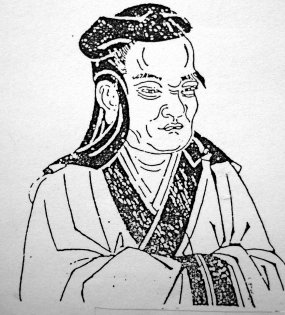 |
| Xu Fu, or Jofuku |
“Xu Fu,” he said, “teach the nightingales of my wood to sing me the songs of the our great poets.”
Xu Fu could not do it for all his wisdom.
“Alas, liege,” he said, “ask me another thing and I will give it you, though it cost me the blood of my heart.”
“Have a care,” said the Emperor, “look to your ways. Wise men are cheap in China; am I the one to be dishonoured?”
“Ask me another thing,” said the Wise Man.
“Well, then, scent me the peony with the scent of the jasmine. The peony is brilliant, imperial; the jasmine is small, pale, foolish. Nevertheless, its perfume is sweet. Scent me the peony with the scent of the jasmine.”
But Xu Fu stood silent and downcast.
“By the gods,” cried the Emperor, “this wise man is a fool! Here, some of you, off with his head.”
“Liege,” said the Wise Man, “spare me my life and I will set sail for Mount Peng-lai where grows the herb Immortality. I will pluck this herb and bring it back to you again, that you may live and reign for ever.”
The Emperor considered.
“Well, go,” he said, “and linger not, or it will be the worse for you.”
Xu Fu went and found brave companions to go with him on the great adventure, and he manned a junk with the most famous mariners of China, and he took stores on board, and gold; and when he had made all things ready he set sail in the seventh month, about the time of the full moon.
The Emperor himself came down to the seashore.
 |
| Xu Fu set sail for Mount Peng-lai |
“Farewell, liege,” called Xu Fu from the junk. So they went with a fair wind for their white sails. The boards creaked, the ropes quivered, the water splashed against the junk’s side, the sailors sang as they steered a course eastward, the brave companions were merry. But the Wise Man of China looked forward and looked back, and was sad because of the uncertain future.
The junk of Xu Fu was for many days upon the wild sea, steering a course eastwards. He and the sailors and the brave companions suffered many things. The great heat burnt them, and the great cold froze them. Hungry and thirsty they were, and some of them fell sick and died. More were slain in a fight with pirates. Then came the dread typhoon, and mountain waves that swept the junk. The masts and the sails were washed away with the rich stores, and the gold was lost for ever. Drowned were the famous mariners, and the brave companions every one. Xu Fu was left alone.
 |
| Mount Peng-lai |
“The Island of Peng-lai is east of the east, and there is Fusan, the Wonder Mountain. On the heights of Fusan there grows a tree whose branches hide the Mysteries of Life.”
Xu Fu lay weak and weary and could not lift a finger. Nevertheless, the junk glided nearer and nearer to the shore. Still and blue grew the waters of the sea, and Xu Fu saw the bright green grass and the many-coloured flowers of the island. Soon there came troops of young men and maidens bearing garlands and singing songs of welcome; and they waded out into the water and drew the junk to land. Xu Fu was aware of the sweet and spicy odours that clung to their garments and their hair. At their invitation he left the junk, which drifted away and was no more seen.
He said, “I have come to Mount Peng-lai the Blest.” Looking up he saw that the trees were full of birds with blue and golden feathers. The birds filled the air with delightful melody. On all sides there hung the orange and the citron, the persimmon and the pomegranate, the peach and the plum and the loquat. The ground at his feet was as a rich brocade, embroidered with every flower that is. The happy dwellers in Mount Peng-lai took him by the hands and spoke lovingly to him.
“How strange it is,” said Xu Fu, “I do not feel my old age any more.”
“What is old age?” they said.
“Neither do I feel any pain.”
“Now what is pain?” they said.
“Tell me,” said the Wise Man, “is this death?”
“We have never heard of death,” said the inhabitants of Mount Peng-lai. “anyway, welcome to the Island of Eternal Youth.”
Soon the youths and maidens of the island gave him to eat of the delicious fruit of the island, they laid him down upon a bank of flowers to hear sweet music. Afterwards they wandered in the woods and groves. They rode and hunted, or bathed in the warm sea-water. They feasted and enjoyed every delightful pleasure. So the long day lingered, and there was no night, for there was no need of sleep, there was no weariness and no pain.
(Selected and edited from Japanese Fairy Tales, by Grace James. Mount Peng-lai is the legendary mountain in the Eastern Sea. In Japan, it is called HORAIZAN, or Mt. Horai; Xu Fu, 徐福, Jofuku was a famous Taoist who lived during Qin dynasty.)
Comments